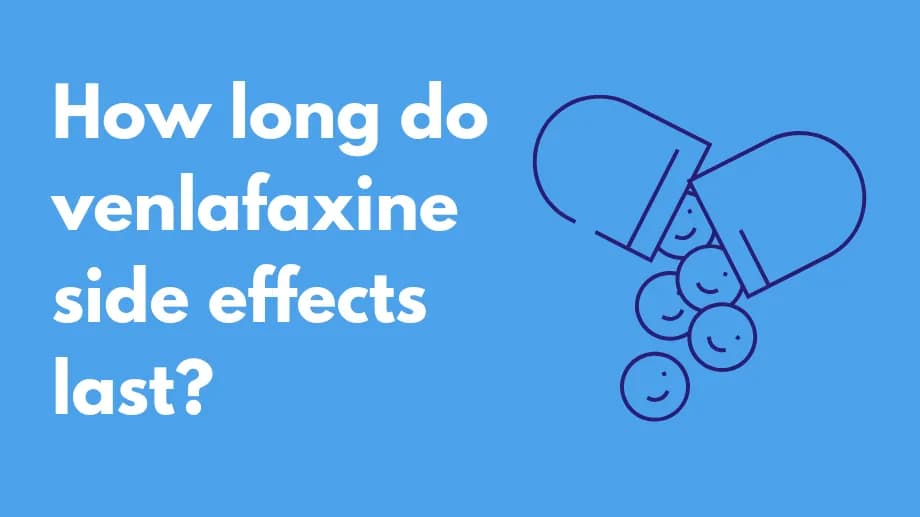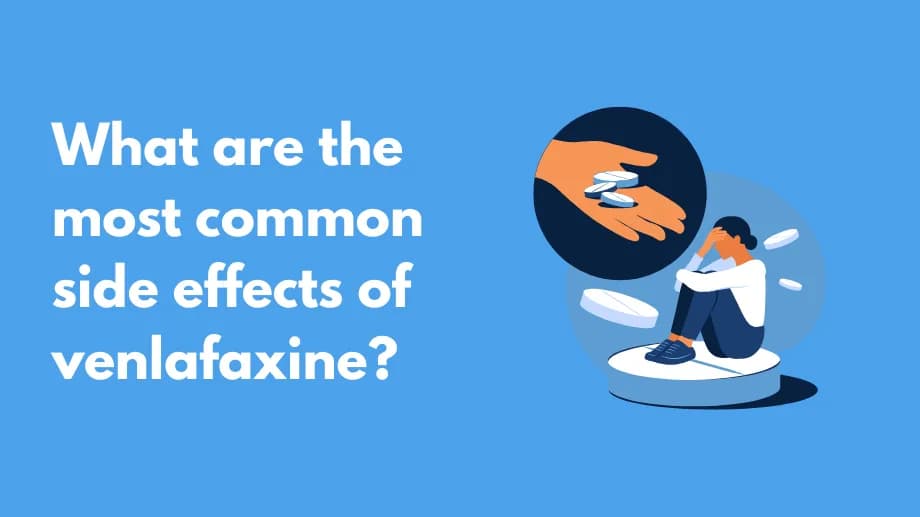How long do venlafaxine side effects last?

If you’re one of the 16.1 million Americans who have depression or one of the 40 million who have an anxiety disorder, your healthcare provider may recommend an antidepressant medication such as venlafaxine. Venlafaxine is an effective treatment option to treat mental health conditions such as depression, anxiety, social anxiety disorder, and panic disorder. While it is generally well tolerated, venlafaxine can cause side effects.
Most side effects are mild and temporary. The most common side effects of venlafaxine include headache, nausea, trouble sleeping, dizziness, drowsiness, dry mouth, and sweating. These side effects do not usually cause any long-term complications and will typically go away after a week or two of starting this medication, as your body gets used to venlafaxine. However, if these side effects do not go away or become worse, you should immediately contact your healthcare provider.
For a few people, they may also experience some more serious side effects. The longer you take venlafaxine, the more likely you will develop side effects such as sexual dysfunction, bleeding, blood pressure changes, serotonin syndrome, and suicidal thoughts and behaviors. If you notice any of these side effects, you should immediately seek medical attention. If left untreated, some of these side effects can be life-threatening.
Venlafaxine FAQs
What are the side effects of venlafaxine?
Some of the most common side effects from clinical trials include:
- Nausea
- Headache
- Insomnia
- Dizziness
- Weakness
- Dry mouth
- Sexual problems
- Drowsiness
- Sweating
- Nervousness
- Constipation
- Loss of appetite
Other less serious side effects of venlafaxine that have been reported include:
- Weight loss or weight gain
- High blood pressure
- Tremor
- Tingling or numbness
- Vomiting
- Gas and indigestion
- Itching
- Yawning
- Twitching
- Dilated pupils
Rarely, venlafaxine may cause some more serious side effects such as:
- Serious, life-threatening allergic reactions, including anaphylaxis. Symptoms include:
- Hives
- Swelling of your face, tongue, or throat
- Shortness of breath
- Increased risk of suicidal thoughts and behaviors. Notify your healthcare provider right away if you have new or worsening depression, panic attacks, or suicidal thoughts or behavior. This is more likely to occur when you first start venlafaxine or when your dose is first changed.
- Serotonin syndrome, especially if taken with other serotonergic medications. Symptoms include increased heart rate, sweating, muscle stiffness, fever, and confusion. Seek immediate medical attention if you experience any of these symptoms.
- A sudden drop in blood pressure. Let your healthcare provider know if you experience dizziness or fainting while taking venlafaxine.
- Increased risk of bleeding. Notify your healthcare provider if you have bruising that does not go away, black-colored stools, pink or red urine, unusual nosebleeds, or bleeding from your gums.
- Manic episodes if you take venlafaxine and have bipolar disorder. Talk to your healthcare provider right away if you notice unusual changes in your mood or behavior.
- Eye problems such as angle-closure glaucoma. You should have an eye exam before starting venlafaxine. Call your healthcare provider if you have eye pain, redness, swelling, dilated pupils, or vision changes (such as seeing rainbows around lights at night).
- Low sodium levels with symptoms that can include confusion, headache, dizziness and fainting, seizures, or coma.
- Lung problems. Notify your healthcare provider right away if you have shortness of breath, a cough that does not go away, or chest pain.
- Discontinuation syndrome. If venlafaxine is stopped suddenly, you may develop withdrawal symptoms such as:
- Anxiety
- Agitation
- Tiredness
- Mood changes
- Confusion
- Dizziness
- Diarrhea
- Seizures
- Headache
Disclaimer: These are not all of the possible side effects of venlafaxine. Contact your healthcare professional for medical advice about any possible adverse effects you experience while taking this medication. You can report your adverse effects to the FDA at 1-800-FDA-1088 or www.fda.gov/medwatch.
What does venlafaxine treat?
Venlafaxine is approved by the U.S. Food and Drug Administration (FDA) to treat adults with:
- Generalized anxiety disorder (GAD)
- Major depressive disorder (MDD)
- Panic disorder (PD)
- Social anxiety disorder (SAD)
Venlafaxine is also sometimes used off-label to treat attention-deficit/hyperactivity disorder (ADHD), hot flashes, diabetic neuropathy, fibromyalgia, post-traumatic stress disorder (PTSD), obsessive-compulsive disorder (OCD), migraine prevention, and premenstrual dysphoric disorder (PMDD). Off-label means that the FDA hasn’t approved it for that condition.
How does venlafaxine work?
Venlafaxine hydrochloride is the active ingredient in brand-name Effexor and the extended-release capsule Effexor XR. It is considered a serotonin-norepinephrine reuptake inhibitor or SNRI. It works by increasing the serotonin and norepinephrine levels in your brain to help improve your mood and relieve symptoms of depression and anxiety.
Are there any drug interactions with venlafaxine?
When venlafaxine is taken with other medications, it can change how they work or make some side effects more likely or severe. You should ask your healthcare provider if any of the prescription drugs, over-the-counter (OTC) medications, vitamins, or supplements you take may interact with venlafaxine, including:
- Monoamine oxidase inhibitors (MAOIs) such as isocarboxazid, linezolid, methylene blue, phenelzine, tranylcypromine, and selegiline
- Other antidepressant medications such as SSRIs, including escitalopram, citalopram, sertraline, and fluoxetine
- Nonsteroidal anti-inflammatory drugs (NSAIDs) such as naproxen, aspirin, and ibuprofen
- Blood thinners like warfarin
- St. John’s wort
- Lithium
- Tramadol
- L-tryptophan
- Amphetamines (venlafaxine may cause false positive test results)
Who should avoid venlafaxine?
When taken as directed, venlafaxine is generally well-tolerated and safe. However, some people should not take this medication. Venlafaxine should not be taken if you have an allergy to venlafaxine, desvenlafaxine, or any inactive ingredients in that particular product. You should also avoid this medication if you have taken a monoaminoxidase inhibitor (MAOI) such as isocarboxazid, linezolid, methylene blue, phenelzine, tranylcypromine, or selegiline in the previous 14 days.
What should you tell your healthcare provider before starting venlafaxine?
Your healthcare provider should know any other medical conditions you have before starting venlafaxine such as:
- Family history of depression, suicide, mania, hypomania, or bipolar disorder
- High blood pressure (hypertension) or other heart problems such as an irregular heartbeat
- Bleeding problems
- Angle-closure glaucoma
- High cholesterol or high triglycerides
- Kidney or liver disease
- History of seizures
- Low sodium levels
- Lung disease
- Alcohol use
- Pregnancy or plans to become pregnant (venlafaxine may harm your unborn baby)
- Breastfeeding or plans to breastfeed (venlafaxine may pass into your breast milk and harm your infant)
How long does it take to adjust to venlafaxine?
It typically takes 4 to 6 weeks after starting venlafaxine for you to see its full effects, but you should start to feel better after 1 to 2 weeks. Side effects such as nausea, headaches, sweating, and dry mouth are common. They are usually mild and go away after a couple of weeks.
Do not miss doses of venlafaxine or stop taking this medication suddenly. If you miss a dose of venlafaxine, take it as soon as you remember. If it is near the time of the next dose, skip the missed dose. Take your next dose at the regular time. Do not double the dose to catch up.
Is it better to take venlafaxine in the morning or at night?
You will usually take extended-release venlafaxine tablets or capsules once a day. You can take them at any time as long as you take them at the same time every day. Venlafaxine can cause drowsiness for some people and for others it can give them insomnia. If it tends to make you drowsy, take it at night. If you have trouble sleeping while on venlafaxine, it’s best to take it in the morning.
Can you have caffeine while on venlafaxine?
If you’re taking venlafaxine to treat an anxiety or panic disorder, caffeine can directly counteract the effect of the antidepressants or make anxiety worse. Caffeine and venlafaxine may also make you more likely to have certain side effects such as insomnia, agitation, dizziness, headaches, nausea, or increased heart rate. While you probably do not cut caffeine completely out, you may want to limit it when you first start taking venlafaxine to see how it affects you.
Related Medications
- Pristiq (desvenlafaxine ER)
- Cymbalta (duloxetine)
- Savella (milnacipran)
- Fetzima ER (levomilnacipran ER)


